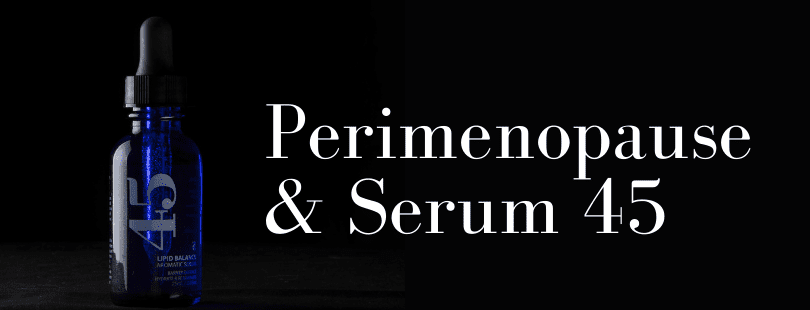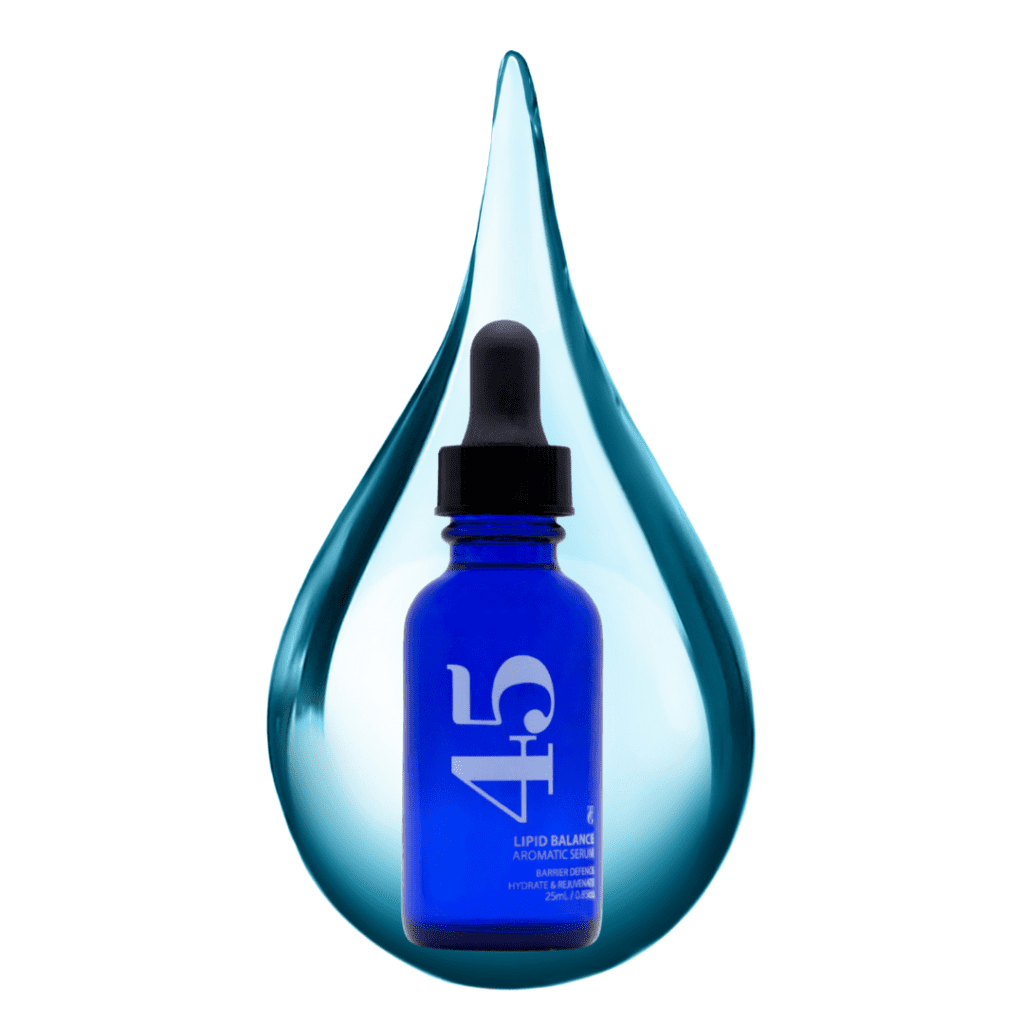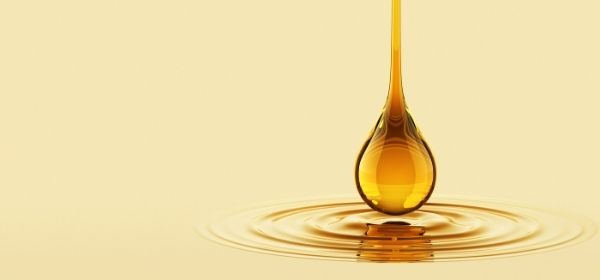Perimenopause & Serum 45

The 40’s bring the first signs of hormonal fluctuations and associated changes and sometimes they are challenges. Keeping your internal heat down so you can sleep, body changes and menstrual issues and of course the changes in your skin showing the early signs of ageing, are all a natural part of the perimenopausal journey.
These symptoms are caused by sudden fluctuations in hormone levels in your body and in particular, the decline of hormones that play a vital role in reproductive health. Many women also can experience significant physical and emotional changes, the effects of which can, understandably, also contribute to the mental health issues.
How Reproductive Hormones Can Impact Your Mental Health
The main hormones associated with the perimenopause are estrogen and progesterone, but it’s important to understand that all hormones in our body are part of an ecosystem, with most hormones influencing or stimulating the production of others.
They aren’t simply hormones that govern the reproductive system, there are estrogen and progesterone receptors throughout your body. When levels of these hormones start to decline sharply during the perimenopause, every system that houses any receptors, including your brain, registers these changes.
As the hormone receptors in your brain start to dip, this disrupts the delicate chain of biochemical activity, which, in turn, impacts the production of mood-regulating hormones, like serotonin and dopamine. Accordingly, women may experience changes in mental health, with an increase in symptoms of anxiety during the perimenopause.

Where does it all begin?
Around the age of 45, some earlier, some later as progesterone levels usually begin to decline. Without progesterone’s calm there is only a storm.
Progesterone produces chemicals that act on the brain like valium that soothes the nerves. These chemicals affect the neural receptors in the same way as valium would. Therefore, low levels of this hormone cause high levels of anxiety, causing women to become very irritable and critical. This then continues to contribute to insomnia, feelings of confusion, depression and severe mood swings leading to exhaustion. The feeling of increased fatigue leads to feelings of being overwhelmed and the inability to cope.
The Importance of Sleep
One of the earliest symptoms to occur and in some cases last many years, are hot flashes or night sweats. Night sweats often lead to fragmented sleep and next-day fatigue. Before a hot flash, your body temperature rises and, consequently, wakes you up. Most hot flashes last around three minutes, resulting in decreased overall sleep efficiency. According to the sleep expert, Matthew Walker, the brain reverts to its primitive pattern of uncontrolled reactivity when sleep-deprived, which explains why anxiety is more likely after a night of broken sleep.
Mood changes, anxiety and general feelings of nervousness are some of the most common symptoms of perimenopause and can be even more undermining than hot flashes or night sweats. These symptoms are often exacerbated by insomnia and fatigue.

Stress
High stress levels create an increase in cortisol. High levels of cortisol at bedtime does not allow the body to shut down to sleep but more important, suppresses serotonin, the hormone important for sleep and mood. This culminates in sleep problems that then contribute to anxiety, agitation and irritability and ultimately depression.
Cortisol also suppresses DHEA (the mother of Hormones) but also suppresses progesterone, causing irregular periods, heavy bleeding and for some miscarriage, for others often hysterectomy.
The icing on the cake so to speak is that cortisol also causes testosterone to be converted to estrogen causing reduced libido and estrogen dominance, which leads to another set of issues such as out of control weight gain.

Sleepless Nights Accelerate Skin Aging
Up until a few years ago, the idea that sleep deprivation made us age faster was just speculation. In 2013, physicians at University Hospitals Case Medical Centre conducted clinical trials aimed to prove that sleep quality impacts skin function and aging. The findings clearly showed that poor sleepers had increased signs of aging and slower recovery from a variety of environmental stressors such as U.V rays. Good quality sleepers recovered more efficiently. Erythema from things such as sunburn in poor quality sleepers was resolved less efficiently, indicating inflammation was not resolved. TEWL was also tested. Barrier function reducing TEWL was more quickly restored in good quality sleepers.
During sleep the body repairs and replaces damaged tissues and cells. Without sleep, the repair process is slowed down, Cortisol levels are raised, which in turn can impede collagen production and accelerate water loss. The result is dry skin and the formation of wrinkles. During sleep, circulation is increased, lack of sleep impacts this process causing a pale, lack luster skin.
If the hot flashes and mood swings weren’t enough, add “constant breakouts” to the list of perimenopausal symptoms. These hormonal changes can cause acne not only at the onset of perimenopause, but also before and after. Stress due to the many other changes happening within the body also contributes to acne. The over production of cortisol wreaks havoc on the skin in many ways, triggering breakouts through increased oil production
In other words, it can be something you’re dealing with for years to come. But the good news (and don’t worry, there is some!) is that, with the right approach and treatment plan, there are ways that you can help keep menopausal acne in check.
Serum 45
An aromatic serum designed to help balance your skin and your emotions. This serum was developed with your age, your hormonal journey and lifestyle as the primary considerations.
Research and evidence to show the effects of essential oils include Inducing Relaxation, Reduce Anxiety, improve overall wellbeing all while balancing your skin as you journey through hormonal change.
For more information click here

A few highlights
Sweet orange
Beneficial for soothing dry, irritated or acne prone skin. Considered to have regenerative properties. Recommended for those who are anxious causing difficulty sleeping. It promotes a positive and joyful mood, it harmonizes feelings and reminds us to laugh when, on occasion we take things a little too seriously.
Neroli
Consider it for all skin types especially dry, sensitive skin with broken capillaries. It is reputed to have a rejuvenating effect on the skin as it has the ability to stimulate the growth of new cells. It is considered one of the most effective oils for reducing anxiety and for those who are stressed.
Ylang Ylang
Promotes emotional stability, reduces irritability, moodiness, frustration, anger and anxiety. It is beneficial for treating extreme mood swings during PMS. It balances moisture in the skin and so is recommended for both dry and oily skin as it rebalances sebaceous flow. Creates a feeling of peace and dispels anger.

Carrier oils
Plant derived oils provide, at the very least, emollient properties to the skin. They are amongst the oldest used health and cosmetic materials known to mankind. They are regularly used and chosen because of their low incidence of irritation, sensitization and comedogenicity. Moisturizing and skin softening are basic uses for oils. As we age our own natural moisture factors do decrease and so these precious plant oils are a natural replacement.
Argan Oil:
Argan oil has been known for centuries for its cosmetic and pharmaceutical virtues. As a free radical scavenger, it has more vitamin E than most and contains carotenes and phytosterols. It prevents the drying and slows the physiological aging of the skin by restoring its hydro-lipid film. Argan oil is also recommended to fortify fragile nails. Try adding this oil to your skin care protocols and keep some at the manicure table.
Avocado Oil:
This oil is extracted from the flesh which contains up to 30% pure oil. Avocado oil is highly moisturizing and skin softening, promotes cellular regeneration and its action on dry and fragile skins is well documented. Repeated use and massage on the skin using this oil has shown an increase in hydration to the upper layers of the skin as well as an apparent increase in the elasticity of the skin.
Soy:
Containing Vitamin B, E, K and essential fatty acids to maintain the efficiency of the skin barrier. Has a rejuvenation and pro-aging effect. It helps to neutralize free radical damage with a large content of antioxidants while preventing dehydration and is recommended for a declining lipid barrier having a moisturizing effect.
For more information click here

Written By Trish Green DiHom(Pract) B.Ed Cidesco Diplomat. Bach Flower Therapist.
Trish is a graduate of the Victoria University of Manchester, Trish is a teacher with 35 years of experience in the education field. For twenty of those years she has been an educator in the esthetics industry. She is an advocate for raising standards in education for Complementary Health Care Practitioners with special interest in Aromatherapy. Her career in the field of natural health and esthetics is wide and varied. From Doctor of Homeopathy to Cidesco diplomat, Trish is a dedicated professional, committed to ongoing education and the education of others.
